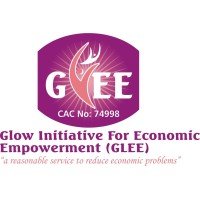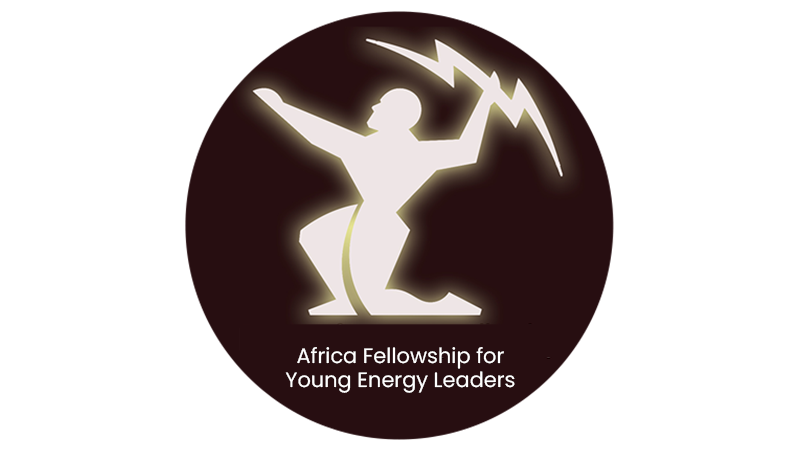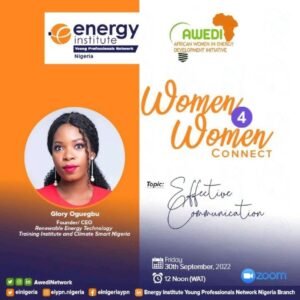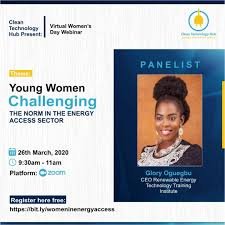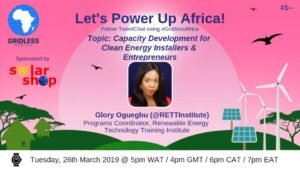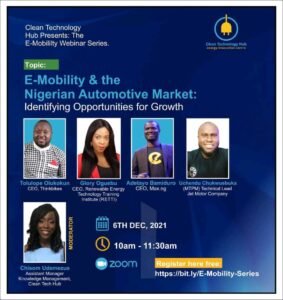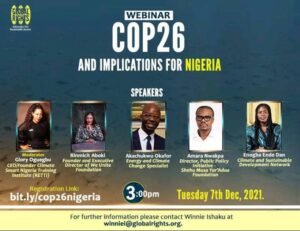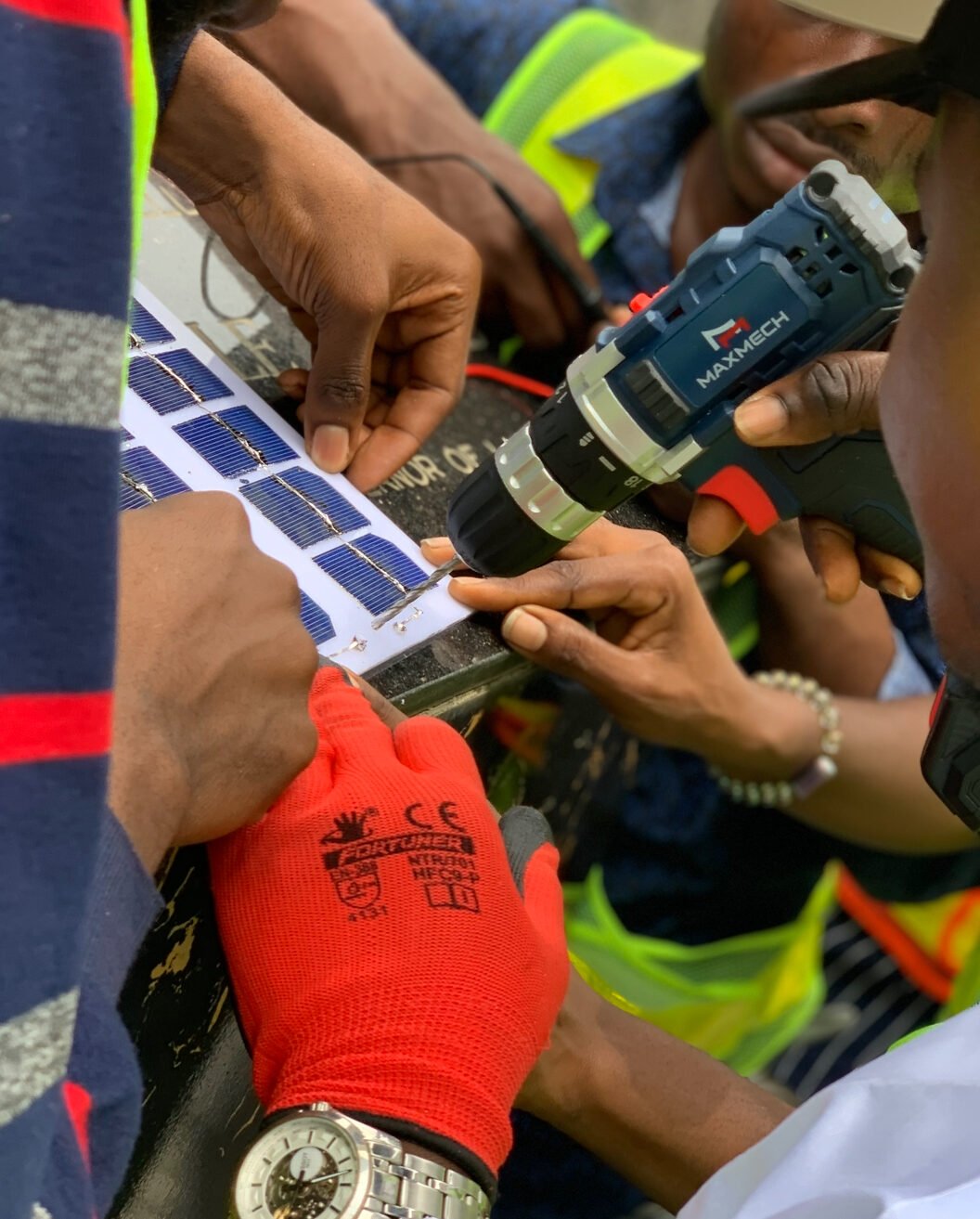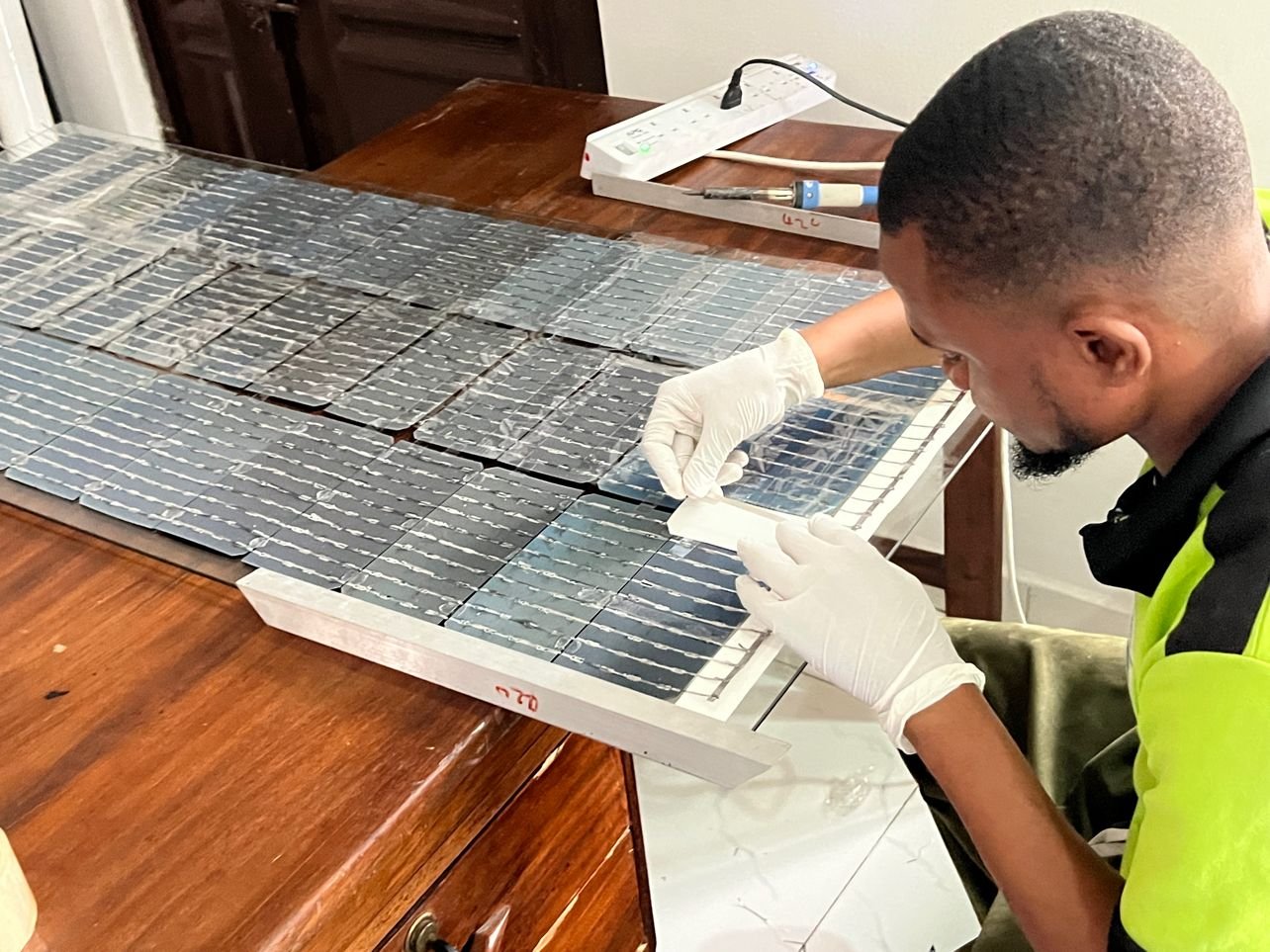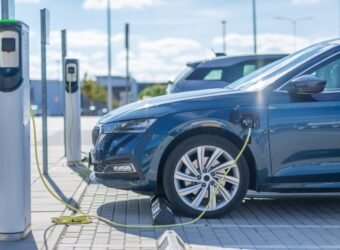Climate Specialist Energy Transition Expert
Sustainability Entrepreneur
Sustainability Entrepreneur
Glory is a development entrepreneur who has won several awards for her work in promoting renewable energy and advocating for climate change. She is the founder / CEO of Renewable Energy Technology Training Institue (RETTI) preparing the next generation of workers to drive the energy transition. Her environmental program - Climate Smart Nigeria is dedicated to championing climate change education in Nigerian institutions and providing capacity building on renewable energy technologies.

About Me
Glory is an award-winning development entrepreneur specializing in the promotion of renewable energy and climate change advocacy for economic growth and development. She’s the founder of Glow Initiative for Economic Empowerment under which their environmental program - Climate Smart Nigeria champions Climate Change Education in Nigerian institutions and provide capacity building on renewable energy technologies.
In 2019 she created the Renewable Energy Technology Training Institute (RETTI) which is improving economic development through the provision of access to clean electricity to benefit 93 million Nigerians without access by training and preparing new solar designers and installers to serve as competent workforce and entrepreneurs..
The Wall
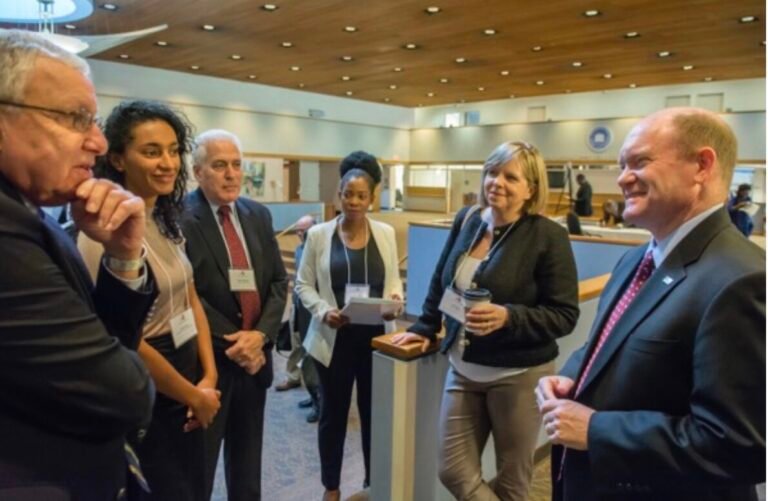

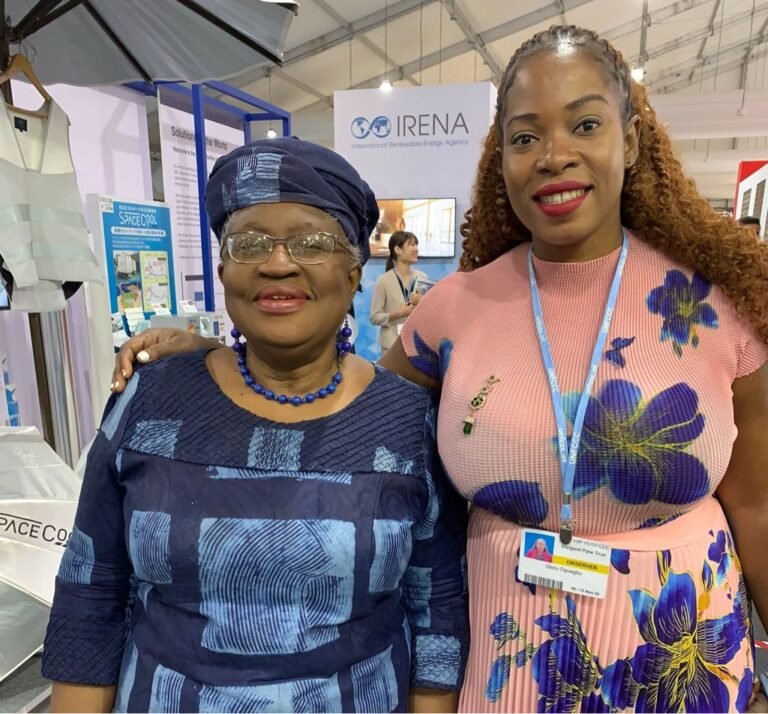

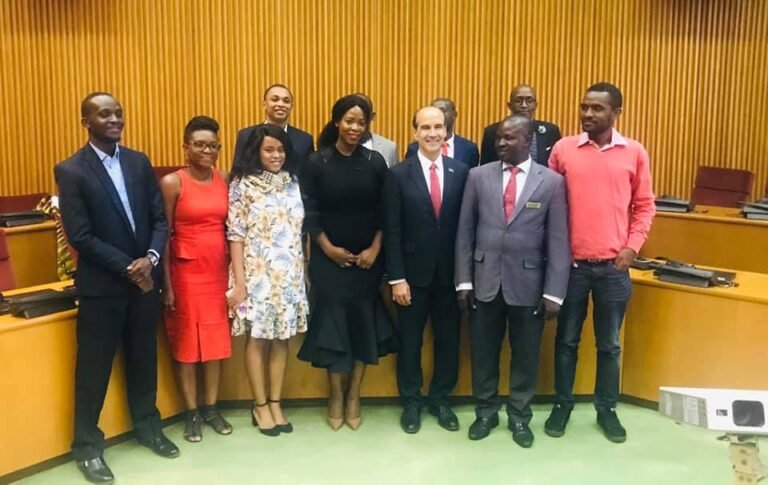
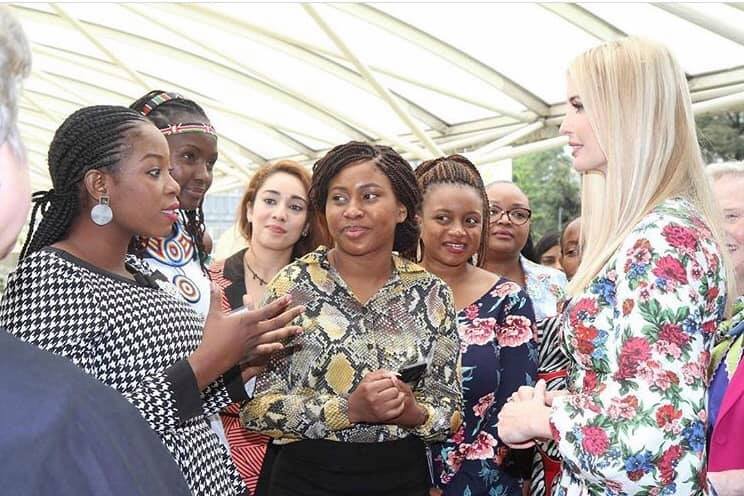
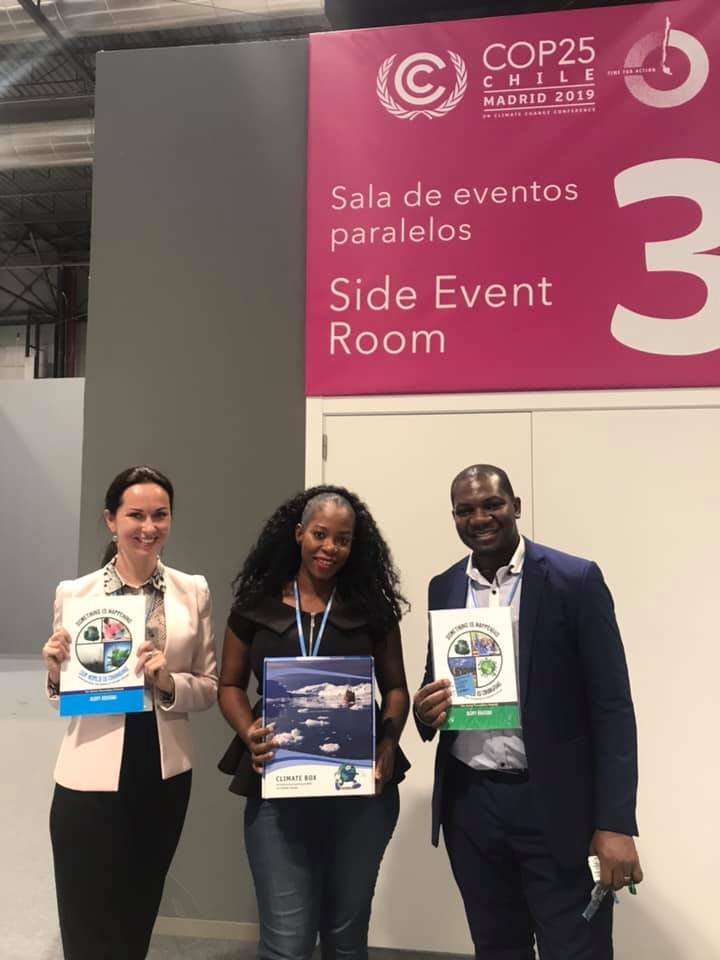


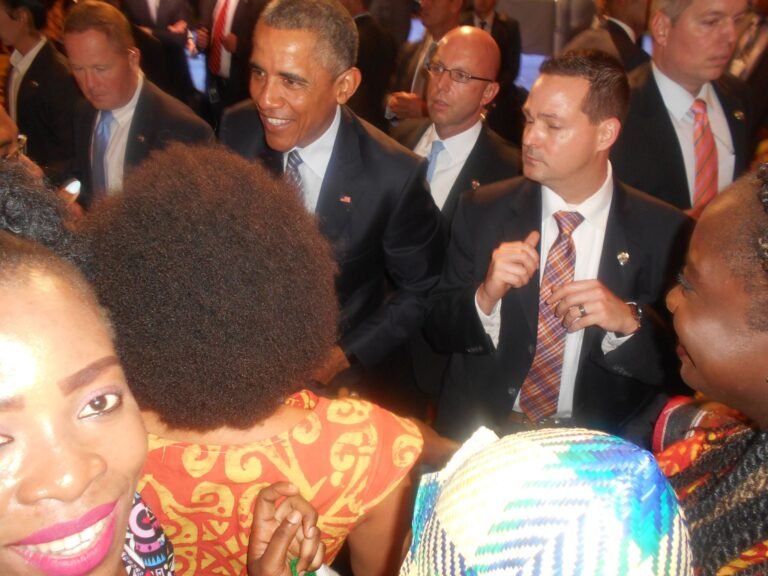


Global Involvements

Glory Oguegbu and President Barack Obama
2015Glory met President Obama in 2015 through the Mandela Washington Fellowship, a recognition for her work promoting a safer and healthier world through climate literacy and renewable energy technplogies
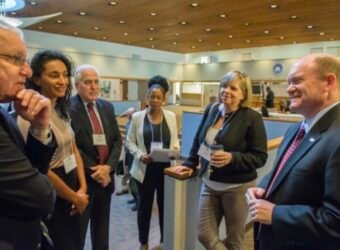
Glory Oguegbu gave a keynote speech alongside US Senator Chris Coons
Sponsored by the US Government to deliver a keynote speech on Climate change alongside US Senator Chris Coons during the university of Delaware / Africa Energy Conference

Glory Oguegbu Launches RETTI Virtual University
Created the first Online University dedicated to renewable energy education
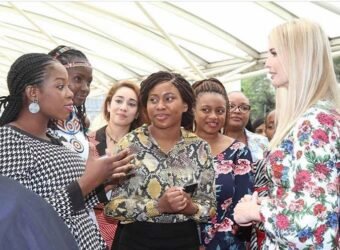
Glory Oguegbu selected by the US Mission to the African Union
Only Nigerian selected by the US Mission to the African Union as one of 15 African female business leaders to attend United States Government’s launch of the OPIC 2X Africa and meet with advisor to President of USA - Ms. Ivanka Trump and the Ethiopian President - Ms Sahle-Work Zewde.

Glory Oguegbu at US government’s launch of the OPIC 2X funding initiative for African women entrepreneurs
Was the only African entrepreneur selected to speak during the US government’s launch of the OPIC 2X funding initiative for African women entrepreneurs and meet with advisor to President Trump – Ivanka Trump

Glory Oguegbu invited as a contributing author on the International Energy Agency’s
Was invited as a contributing author on the International Energy Agency’s - World energy Outlook special report – Africa Energy Outlook," where she shared insights on Nigerias’s energy situation.
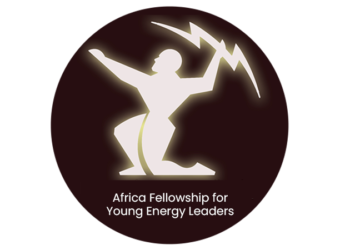
Glory Launced Africa Fellowship for Young Energy Leaders (AFYEL)
Created the first academic fellowship program globally focused on training young African engineers, utility workers and PhD students to advance Africas Electrification

Glory Oguegbu Co- authored the World Energy Outlook’s special Report
Co- authored the World Energy Outlook’s special Report – The 2019 Africa Energy Outlook, a publication of the International Energy Agency.

Glory Oguegbu Co-authored an article that was published by the International Journal of Strategic Energy and Environmental Planning
Co-authored an article that was published by the International Journal of Strategic Energy and Environmental Planning, Volume 2, issue 6, November 2020 titled - Empowering Nigerian Women through Solar PV Training and Installation.

Glory Oguegbu has met with a number of high profile leaders
Has met with a number of high profile leaders including President Barack Obama, US Senator Chris Coons, Ms Ivanka Trump, Gov. Jack Markell of Delaware, Ethiopian President – Ms Sahle-Work Zewde.
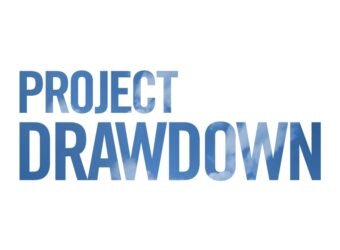
Glory is an Advisory board member of Drawdown Lift Advisory Council
Glory is an Advisory board member of Drawdown Lift Advisory Council, a US leading climate solutions organization – Project Drawdown

Glory Oguegbu
Glory is a coach for Entrepreneurs on the Greentech Fellowship Program in partnership UK Nigeria Tech Hub
What I AM
Sustainability
Glory was named as a top 5 Leading woman globally in sustainability by the Economist. Her work in economic development, renewable energy and climate change ensures the sustainability of people, profit and planet.
Renewable Energy Specialist
Through the Renewable Energy Technology Training Institute Glory is championing the development and the understanding of innovative energy and climate tech for an increased standard of living.
Climate change activist
Through the Climate Education Toolkit, Climate Data Policy Initiative and Climate Leadership Fellowship Glory is leading a better world by improving climate knowledge and promoting contextual climate action. She has shared her climate vision in the global COP across 3 countries.
Founder of Glow Initiative - Empowering Local Communities
She is the founder of the Glow Initiative for Economic Empowerment, an organization that aims to empower individuals and communities through various initiatives.
Champion of Climate Smart Nigeria
Glory's environmental program, Climate Smart Nigeria, focuses on providing education and capacity building related to renewable energy technologies and climate change.
Leading the Education for Energy Transition
As the Executive director of the Africa Fellowship for Young Energy Leaders (AFYEL), Climate Leadership Fellowship (CLF), RETTI Virtual University (RVU) Glory is ensuring that more youths get access to the education needed to switch to careers that align with the global energy transition
Featured in
My Blog
Manufacturing Renewable Energy Technologies Locally; Insights from African Youths and Innovators
I recently held an audio event discussing the challenges and opportunities with locally manufacturing of renewable energy technology in Africa. It was an engaging conversation with 44 registered attendees and 14 active participants, all passionate about Africa’s energy future. Participants came from 6 African countries with Kenya, Nigeria and Ghana mostly represented.
Renewable energy presents a critical opportunity for Africa, not just in terms of mitigating climate change, but as a driver for economic growth and development. By harnessing clean technology manufacturing, Africa can create new revenue streams and employment opportunities across various value chains. However, we also acknowledged the challenges, particularly in areas like unclear policies, inconsistent regulations, and an often tough business environment.
During the event, we discussed four key opportunities and four major challenges that I’ll elaborate on in a follow-up post. Today, though, I’d like to highlight some thought-provoking contributions from both experienced professionals in the energy sector and young people who are deeply involved in renewable energy innovation.
These voices shed light on the ways Africa can strengthen its position in the global renewable energy transition.
1. The Importance of Education and Local Manufacturing
Engr Joseph made a crucial point about the lack of widespread education on renewable energy in Africa. He emphasized that for Africa to fully embrace renewable energy, there needs to be a concerted effort to educate the masses on its benefits and the importance of local manufacturing. He stated that without a solid foundation of knowledge, we will continue to rely on foreign expertise and technology. I couldn’t agree more. As one of my mentors, Nobel laureate Joseph Stiglitz, recently said in his book, “People, Power, and Profits”, “Education is one of the most powerful tools to unlock human potential.” This is why we are so committed at RETTI to training the next generation of African energy leaders—not just in renewable energy design and installation, but also in solar PV production and assembly.
2. The Role of Universities and Local Faith
Joseph also highlighted the importance of involving African universities in the renewable energy conversation. Our universities must become hubs of research, innovation, and development for clean energy technologies. This is not just about waiting for foreign investors to solve our problems. We need to place faith in ourselves—our people and our institutions—to lead the way.
3. Questioning Fossil Fuel Management
Sam Edem raised an important question about Nigeria’s vast fossil fuel resources and why they haven’t been utilized more effectively. He asked why, despite decades of oil and gas production, we are still flaring gas and missing out on the economic potential of these resources. He also mentioned the Nigerian government’s recent dollar bond initiative to address forex scarcity and suggested that a similar approach could be applied to raise funds specifically for renewable energy manufacturing. Sam’s point underscores the need for decisive leadership and innovation beyond government intervention. The private sector, civil society, and communities also have a role to play in driving the clean energy transition.
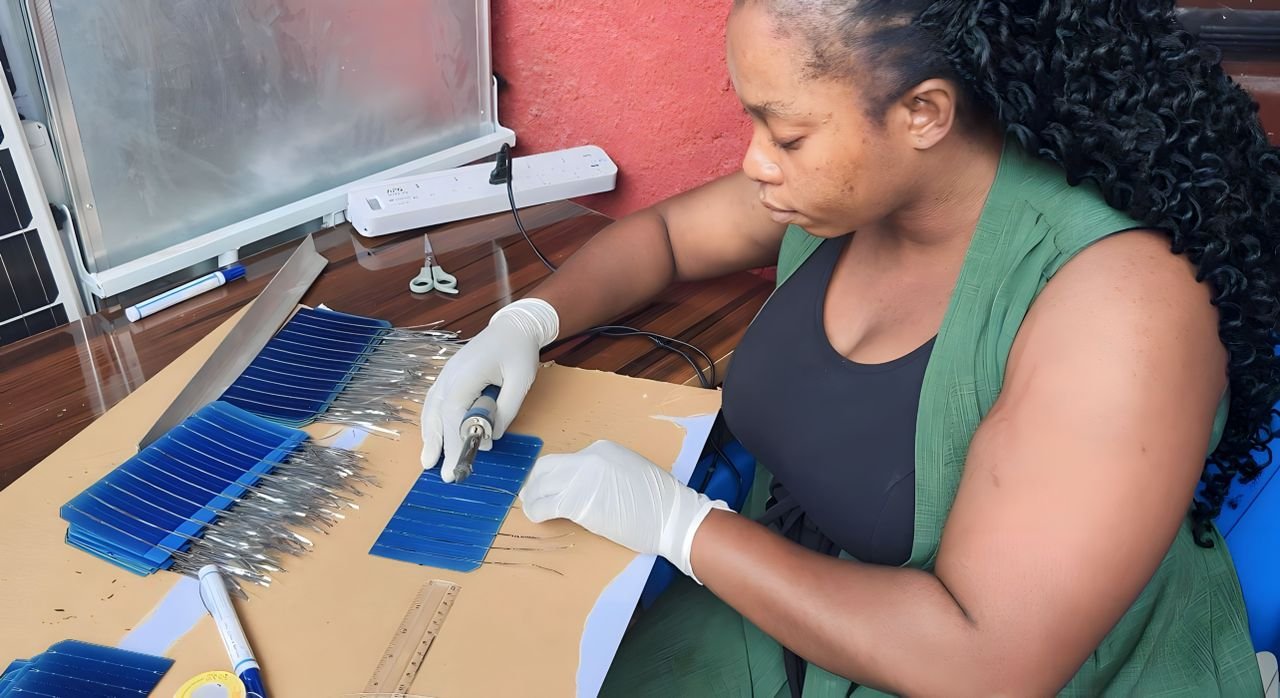
4. Lack of Visibility for Youth Innovators
Fowedlung raised a powerful point about the innovations coming from young African entrepreneurs in the clean energy space. He noted that despite the creativity and passion of these young innovators, many of their ideas and products remain invisible to the larger market. “Are African innovations being overlooked?” he asked, calling for intentional action to shine a spotlight on African solutions. I completely agree, and this is exactly why we create platforms like this LinkedIn audio event and initiatives such as the Climate Leadership Fellowship and Africa Fellowship for Young Energy Leaders (AFYEL). These platforms provide opportunities for young African innovators to showcase their work, gain recognition, and access capacity-building opportunities.
A Call to Action
The conversation we had was insightful and inspiring, with key contributions from African youth that cannot be overlooked.
The conversation during this event was just the beginning, and I am grateful to everyone who participated. We explored critical questions, shared valuable insights, and reaffirmed the importance of local action in Africa’s renewable energy journey. Stay tuned, as I’ll be sharing more insights and expanding on the key takeaways from the session in the coming days.
It’s clear from these points that the future of Africa’s energy sector hinges on educating our people, involving our institutions, holding leaders accountable, and amplifying local innovations. At the Renewable Energy Technology Training Institute (RETTI) we are committed to addressing these challenges by creating platforms for young people to showcase their ideas, develop their skills, and lead the renewable energy transition.
But the question remains: How do we ensure that Africa becomes a global leader in clean energy manufacturing and not just a consumer of foreign technologies? I look forward to hearing your thoughts.
ABOUT THE AUTHOR

Glory Oguegbu is an Obama Scholar, an award winning climate specialist, energy transition entrepreneur and author dedicated to promoting access to electricity through clean and renewable energy whilst preserving the planet at the same time. She’s the founder and CEO of the Renewable Energy Technology Training Institute (RETTI) and the RETTI Virtual University for Energy Education which is investing in workforce development for the transition to sustainable access to clean electricity, ultimately to benefit 600 million Africans and 87 million Nigerians who are living without access to electricity. Her company RETTI has since trained 3000+ engineers and has worked with them to provide
solar electricity for 25, 000 homes and businesses across Nigeria.
RETTI’s CSR initiative, the Africa Fellowship for Young Energy Leaders is investing in the skills of young engineers across four main
renewable energy technologies – Hydropower, Offshore wind, Solar Power and Bioenergy. Currently in its fourht cohort, the six months’ program has invested into 210 engineers from 35 African countries.
To promote local manufacturing and accelerate electricity, Glory has recently created the RETTI Energy Innovations Company whose flagship project – the RETTI Solar Panel Factory is working to support the local creation of solar panels and other renewable energy technology creating massive jobs, improving electricity access and reducing Nigeria’s dependence on Chinese technology.
As an accomplished author, she has written five books focusing on climate and energy transition tailored to African contexts, a move she made after she didn’t find books relating to African contexts to engage students, her books were key in creating Africa’s first contextualized climate education toolkits which has reached 60, 000 students and 123, 000 community members. Fueled by a passion for bridging the gap in Climate knowledge, Glory through her non-profit established the Climate Leadership Fellowship to give select Nigerian youths the tools they need to combat local climate change impacts and build collective national climate resilience. In partnership with Access bank,
Nigeria, the program has welcomed 200 fellows in six cohorts who are from the six geo-political zones of Nigeria.
Africa’s Renewable Energy Revolution: Will the Continent Lead or Lag in Clean Technology Manufacturing?
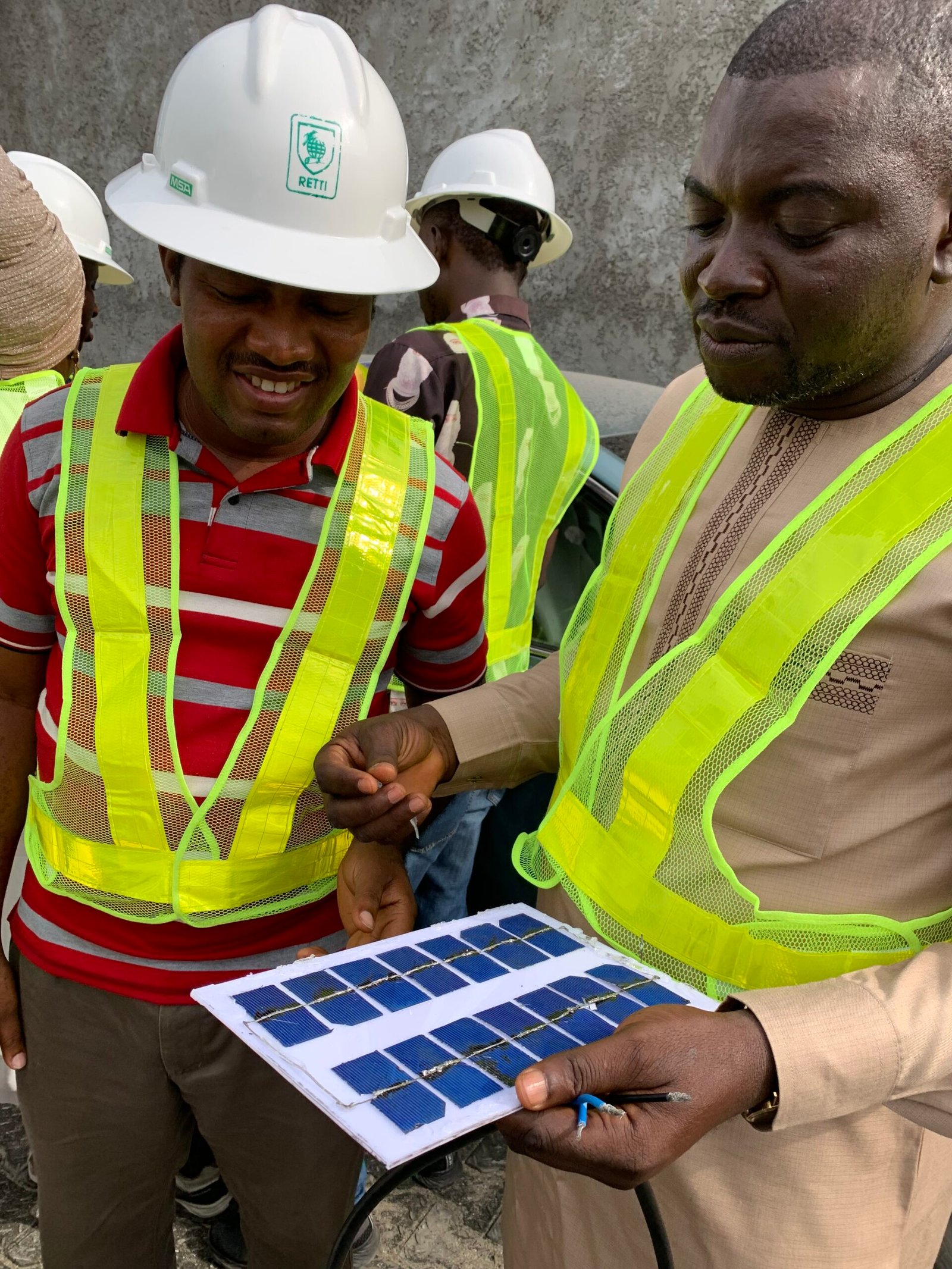
Image source: RETTI Energy Innovations
Africa stands at a critical juncture where it can either continue as an importer of renewable energy technologies or take bold steps to become a global player in their production.
Potential and Opportunities
Manufacturing renewable energy technology in Africa holds great potential, yet, it is fraught with challenges. As the continent prepares for a shift in global energy consumption, renewables are expected to power 60% of Africa’s energy needs by 2050. This transition signifies a move away from fossil fuels and a critical opportunity for Africa to become a leader in Renewable Energy Technology Manufacturing.
Natural Resources and Workforce
The continent is rich in natural resources that are essential for renewable energy technologies, such as abundant sunlight for solar power and vast wind corridors for wind energy. Additionally, Africa’s large and youthful population represents an untapped labor force that can be trained to build a skilled workforce for the renewable energy sector.
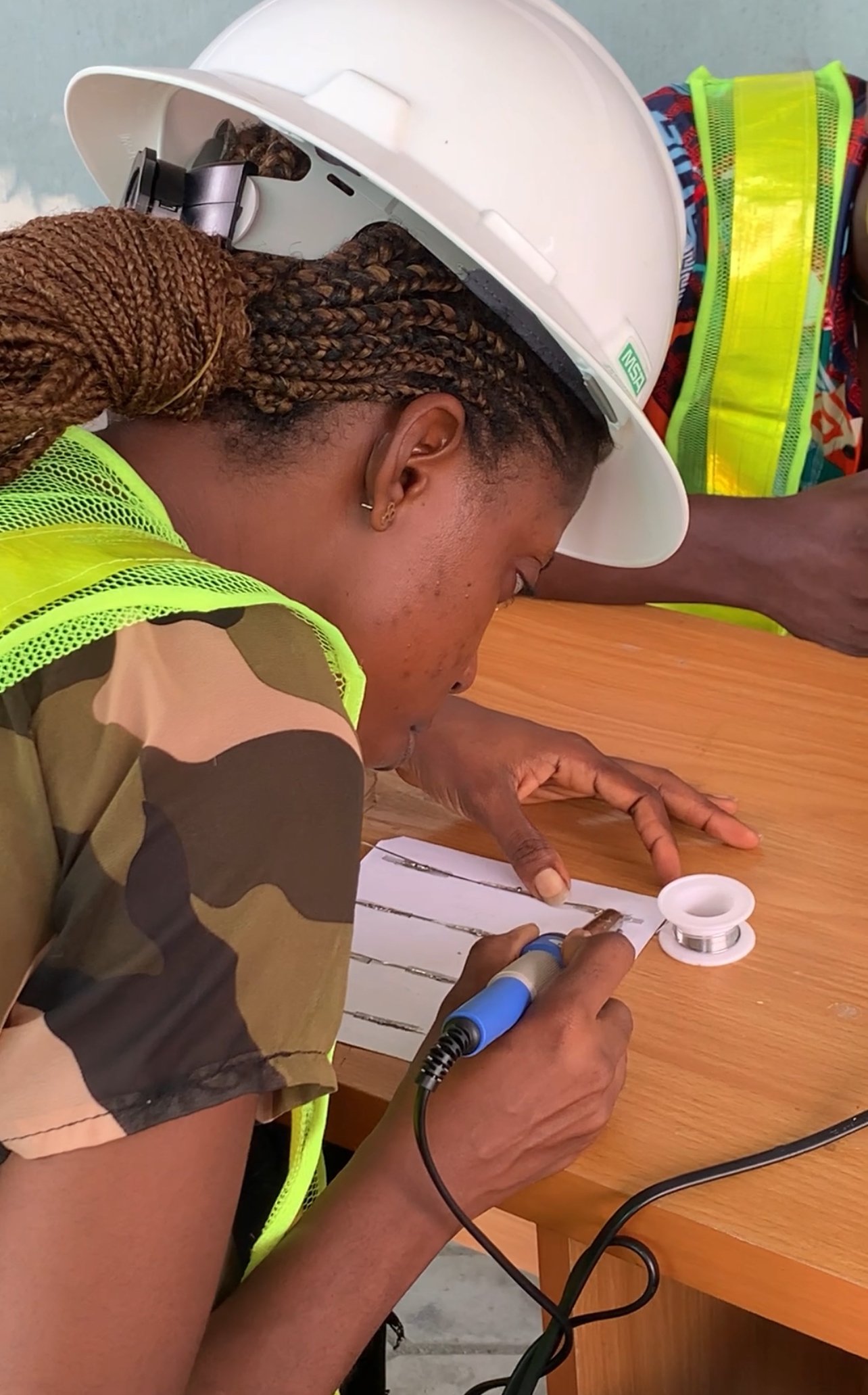
Proactive Measures by African Countries
Several African countries have already taken proactive measures to create a conducive environment for renewable energy development. For instance, South Africa, Kenya, and Morocco have established robust policy frameworks and incentives to attract investment in renewable energy projects. Nigeria and Ghana has created their Energy Transition Plans. These initiatives have led to a steady increase in the deployment of solar and wind technologies, laying the groundwork for local manufacturing. Moreover, regional bodies like the African Union have been advocating for a unified approach to energy policy, which could further streamline efforts to build a thriving renewable energy manufacturing industry.
Challenges and Obstacles
However, Africa’s journey towards this goal is not without obstacles. Inadequate infrastructure, limited access to financing, and a shortage of skilled workers pose significant challenges to developing a robust renewable energy manufacturing sector. If these issues are not addressed, Africa risks missing out on the transformative potential of renewable energy.
The Broader Impact of Renewable Energy
Nevertheless, the need for power in Africa extends beyond the global energy transition; it is essential for the continent’s overall development. Renewable energy is not just about reducing carbon emissions; it’s about powering industries, homes, and the future of Africa. To seize this opportunity, Africa must invest in local manufacturing capabilities, foster innovation, and create enabling policies that support the growth of the renewable energy sector. The time for action is now.
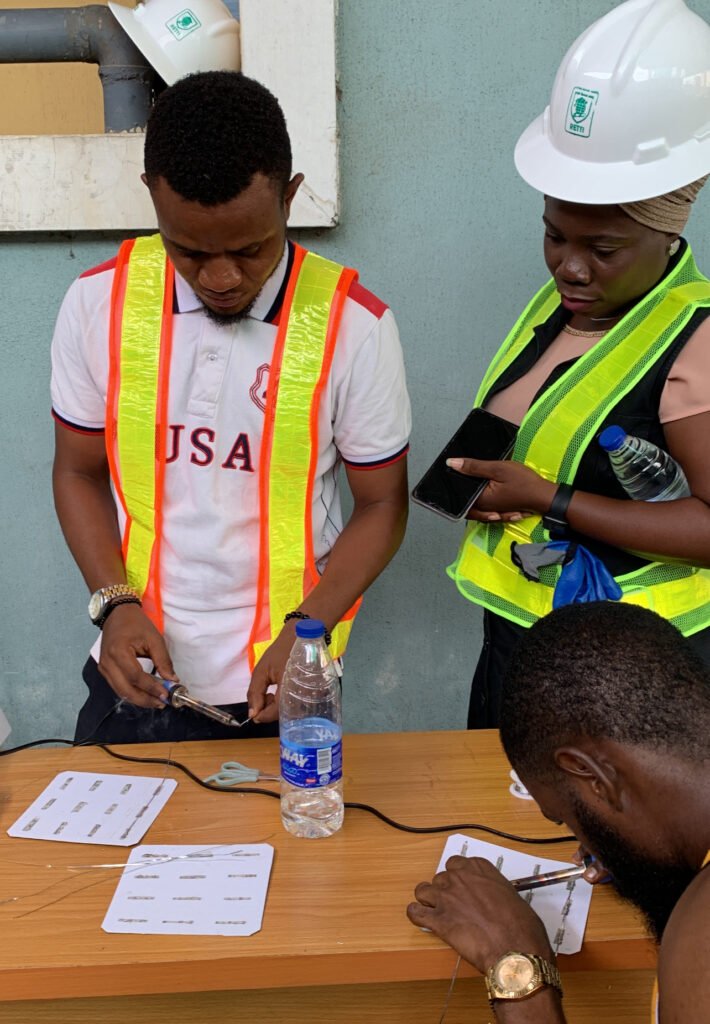
Ongoing Initiatives and Efforts
Efforts are already underway to address these challenges and seize the opportunities. Initiatives like the African Renewable Energy Manufacturing Initiative (AREMI), the African Development Bank’s Desert to Power program, and Power Africa are focused on promoting local manufacturing of renewable energy technologies across the continent.
Additionally, businesses like DPA Africa, Arnergy, Auxano Solar and RETTI Energy Innovations in Nigeria, SolarWorks! in Mozambique and Malawi, and M-KOPA Solar in Kenya are actively engaged in the manufacturing and distribution of renewable energy technologies like solar home systems. Auxano Solar and RETTI Energy Innovations assemble and manufacture solar panels. These organizations and businesses are critical in building the necessary infrastructure, developing a skilled workforce, and securing financing to support Africa’s transition from an importer to a manufacturer of clean energy technologies, positioning Africa as a key player in the global renewable energy market.
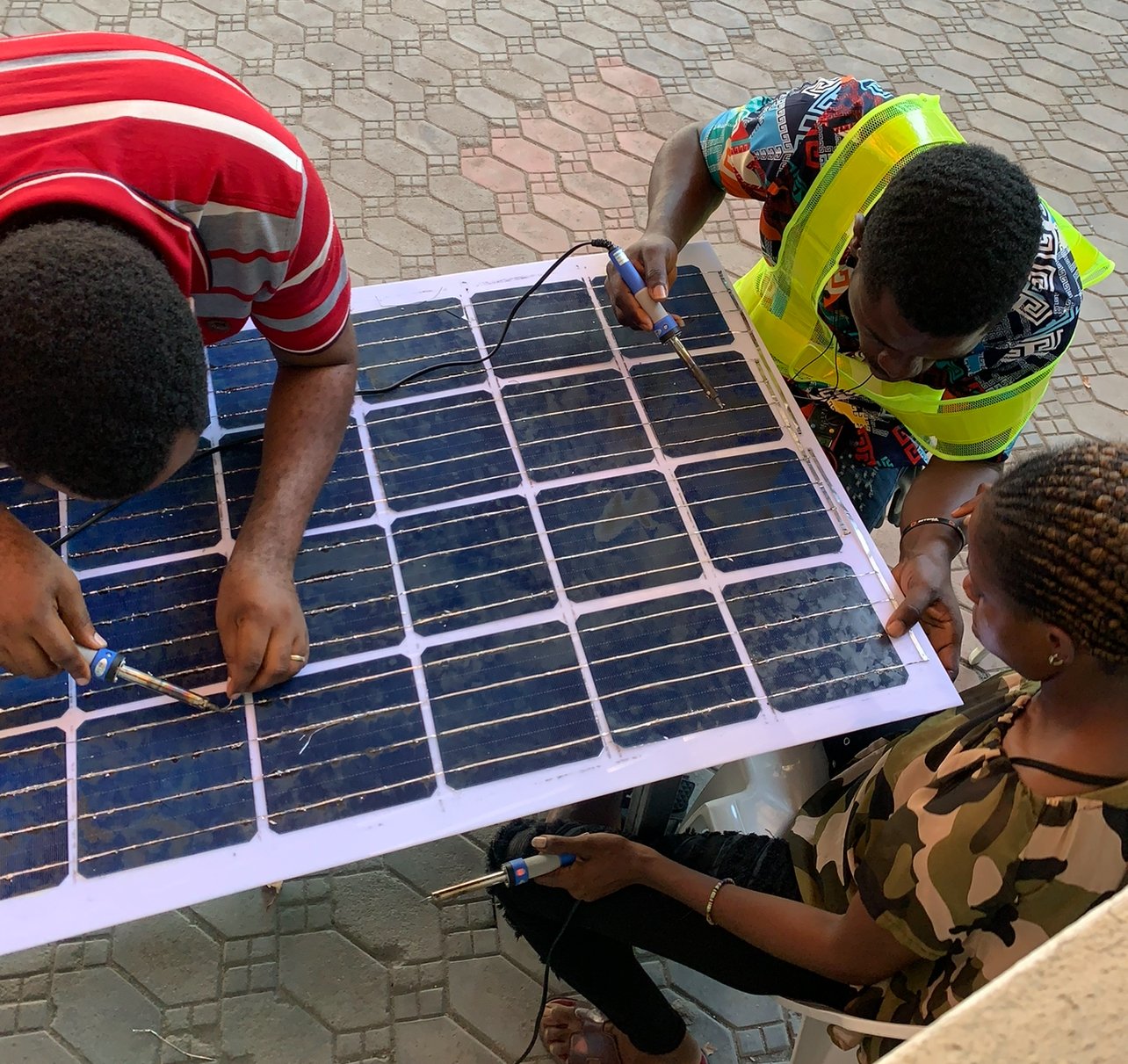
References:
All Images: RETTI Energy Innovations
International Renewable Energy Agency (IRENA) IRENA Africa
African Development Bank (AfDB) AfDB Desert to Power
International Energy Agency (IEA) IEA Africa Energy Outlook

Vision Document for the Development and Deployment of Electric Vehicles in Nigeria
VISION DOCUMENT
FOR THE DEVELOPMENT AND DEPLOYMENT OF ELECTRIC VEHICLES IN NIGERIA
Current Scenario, Opportunities and Way Forward
Introduction
This vision policy document will present an overview of the current scenario in the Nigerian EV industry, review the existent business models and recommend a strategic roadmap that will guide policy making for the development and deployment of electric vehicle and vehicle to everything services in Nigeria. Additionally, it will share insights on the appropriate steps to take to aid the development of Charging Infrastructure and Power System Integration of Electric Vehicles for NIGERIA.
General overview of the current EV scenario in Nigeria
Nigeria has 12,500 MW of installed generation capacity, being largely dependent on hydropower and fossil (gas) thermal power sources; 12.5% and 87.5% respectively. Currently though, only 3,500 MW to 5,000 MW is typically available for onward transmission to the final consumer, with the extensive losses attributable to many of the plants’ recurrent challenges such as maintenance and repair requirements, trips, faults, and leakages, that make them unavailable for evacuation to the national grid. In 2005, the Nigerian government enacted the Electric Power Sector Reform Act of 2005, which called for the vertical unbundling of the Nigeria Electric Power Authority along functional lines of generation, transmission and distribution and retailing. The Nigerian national power utility company was unbundled into a series of 18 successor companies: six generation companies, 12 distribution companies covering all 36 Nigerian states, and 1 national power transmission company.
In the automobile sector, Nigeria experienced significant surge in ICE automobile sales following independence in 1960. This led to the growth of dealerships like Leventis, R.T. Briscoe and UAC. Assembling of cars only commenced in the 1970s when government entered into partnerships with the French company Peugeot to set up Peugeot Automobile Nigeria (PAN) in Kaduna. This resulted in increased production of locally assembled cars. However, as the country’s economic fortunes suffered significant decline in the 1990s, this led to a halt in the car manufacturing sector and caused an increase in the importation of fairly used vehicles popularly known as “Tokunbos” which has became the order of the day. In 2012 alone, Nigeria spent about $3.5 billion on car importation.
According to the National Bureau of statistics there are 11.8 million cars on Nigerian roads with 110, 000 imported cars per year. PWC estimated that In 2014, 410,000 cars were imported into the country, about 74% were used cars.
The Nigeria EV market is very nascent and would have been said to be non-existent if not for few activities spotted in the electric vehicle sector. Nigeria is currently facing lots of challenges and there are arguments about the country’s readiness for electric vehicles. Most of the moves being made are from private sector companies and a few by power and local governments. Egbin Thermal Power Station, one of the nation’s six power generating stations, also West Africa’s largest generating station with installed capacity of 1320 MW have launched in October 2020, 20 electric shuttle busses and 500 bicycles for members of its community.
On the aspect of manufacturing, Nigeria’s first indigenous automobile manufacturer Innosson Motors has recently declared their intention to manufacture electric vehicles (1) Jet Motors Company, a Nigerian-based automobile manufacturer have raised $9 million (2) for the manufacture of electric vehicles. Meanwhile, Nigeria based auto manufacturer Stallion Motors has announced the introduction of an electric vehicle – kona into the Nigerian market in 2020 (3).
PSC Solar Industries announced in 2018 the launch of their charging equipment for sales.
Electric vehicles will be useful for the Nigerian economy especially in its transport sector especially for two and three wheelers to support with mass transit and curb air pollution. It also makes better economic sense for car owners, fleet owners, transport companies etc because it will cost less than N300 ($ 0.80) to recharge a vehicle for range of 500 Kilometers compared to over N4,000 ($9) with the ICE equivalent.
Accessing what EV charging policy and regulation Exist in the Country and Nigeria’s Readiness for Electric Vehicles
Nigeria is an oil fueled economy. As a result there seems to be a complete lack of political will to provide an enabling environment from the government aspect. The private sector however have started to take small steps to stimulate the market. There is no electric vehicle charging regulation or policy existent in Nigeria at this time. On Wednesday 17 April 2019, a senator brought the issue of electric cars to the national consciousness by attempting to get a bill, the Electric Cars (Introduction b) Bill 2019, SB. 726, passed.
The bill which focused on phasing out Petrol vehicles and introducing electric cars by 2035 was soundly defeated. The senator was made to withdraw the bill following observation by his colleagues that it is practically impossible to force cessation of the use of internal combustible engine vehicles. His colleagues reminded him that Nigeria is a major oil producer and that the introduction of the electric car would hurt our economy greatly.
Despite this, the private sector has begun to make moves towards the deployment of electric vehicles. Arthur Energy recently created three solar powered tricycles, two of which are used commercially. The CEO is working to raise funds to mass produce. Ebonyi state government in Nigeria launched the Zero Oil Economy initiative where the state has manufactured electric tricycles which has been given to women to drive commercially. The three wheeler can undertake a 30-kilometer distance when fully charged. Likewise, the University of Nigeria unveiled its unveiled its first five-seater electric car with intentions to commercialize. A two wheeler taxi hailing company recently launched electric tricycles and has signed a contract with a solar company to install charging infrastructure for them, etc.
Moreover, Nigerians are eager to patronize electric vehicles as transport solution. In preparation to launch its electric taxi hailing business, a local start-up company – Gllyd Electric is conducting a survey to learn commuters preference for electric taxi against its ICE equivalent. 98 percent of its respondents so far choose to patronize an electric taxi.
It therefore has become paramount that Nigeria creates a specific policy and regulation for the electric vehicle sector to enable it thrive. Nigeria should create a holistic regulation to cover the Charging Infrastructure and the five accompanying elements – speed of charging, standardization of charger, use of infrastructure, the process and the power flows to decide if the installed infrastructure will also give a bi-directional flow of electricity to unlock vehicle to everything services. The regulation should also cover the consumer types, characteristics of the electric vehicles and identify the key stakeholders and their specific roles.
Insights on viable EV charging business models Nigeria and possible business model innovations in the short, medium and long term.
Nigerian citizens have openly shown support for electric vehicles while some have argued its sustainability because of the country’s weak electricity infrastructure. However, there is increased awareness about how solar power, of which the country has in abundance can be the saving grace as the country’s already active and well regulated solar minigrid sector can take the lead to build solar charging and battery swapping stations. The following business models have been observed:
- Community Ownership Model; The interesting business model noticed was that of Ebonyi state government in Nigeria training and working with local electricians and artisans to build electric tricycles under the Governors Zero oil economy initiative. The innovation here is that artisans and electricians are trained to manufacture the vehicle car parts and after completion, the electric tricycles are then given out to women under a new initiative called – Women E- tricycle Empowerment program where they are trained to drive the tricycle for commercial purposes and pay a small monthly fee under a rent to own

- Sales and Installation of Charging Accessories; PSC Industries Limited, a Lagos, Nigeria-based solar electricity and renewable energy total solutions manufacturer, has announced the introduction of EV chargers for electric vehicles in Nigeria. They manufacture and sell up to five different kinds of EV charger including CSP series port, CWS series Wall and of different sizes of up to 60KW. Their EV chargers include commercial, industrial, residential and mobile EV DC chargers which could suit the residential car owner, portable/transportable chargers and large petrol station type chargers.” The company plans to partner with large multinationals as well as indigenous oil firms to add these EV chargers to existing petrol stations across Nigeria. On the other hand, an automobile importer Ecolife Now, started the importation and sales of electric tricycles in 2016. So far they have recorded sales of nearly 300 units of the vehicles in Nigeria.
- Collaboration Between Electric taxi hailing Companies and Solar Companies – In August 2020, a popular fleet motorcycle taxi hailing company, MAX NG launched its e-motorcycles , the MAX E Series which has 1500mAh battery life and a running speed of 60km/h MAX. They partnered with a Solar company – Rubitec Solar which also has minigrid power stations across the country to provide solar powered charging and swapping stations for the e-bikes. This is already operational in Ogun State Nigeria. It is interesting considering the role that electric vehicles can play for a minigrid power The batteries used for the fleets of the motorbikes will charge from the mini-grid.
This will draw a flexible and substantial load of electricity that can provide an income stream for the mini-grid. Additionally, stationary batteries which are used for battery swaps can be used for electricity storage. Through this kind of collaboration, the minigrid companies earn additional revenue by charging electric vehicles and swapping batteries which also serves as anchor load for their system. MAX E series business model is innovative. They are working with their partner to design more swapping stations, to support quick turnaround of about 5 minutes per driver and locate charging stations along accessible routes for drivers. Their battery health is remotely monitored, the EVs and batteries are tracked remotely on their IoT network. They have also set up a metering system which accounts for 100% of the power utilized.
- Partnerships with Gas and Petrol Stations: Nearly all the startups interviewed for this project listed their plans to work with petrol stations to set up charging or battery swapping infrastructure and share profit with them as an
In the Context of Nigeria, here are Recommendations on steps to incorporate EV as a load in the system.
- Minigrid Companies adopting Electric Vehicles as a means of Additional Revenue; According to IRENA, EVs represent a paradigm shift for both the transport and power sectors, with the potential to advance the decarbonisation of both sectors by coupling them. Nigeria’s minigrid sector is rising by the day. There are 11 minigrids in the country which represents a 17% growth from 2005 to The growth recorded has been as a result of massive government support through a clear policy and regulation. One of the main challenges of Minigrids is that they are costly to install, and often have a low electricity demand from domestic customers.
This makes it hard to achieve commercial viability without ‘anchor’ loads (larger electricity demand from customers able to pay. Therefore, electric vehicles can support minigrid companies by the addition of more productive electricity loads to the system and batteries can create additional electricity storage because according to a world economic forum blogpost, Energy storage that allows electricity to be saved and used at different times of day is a key component for ensuring the viability of renewables in Africa. Additionally, under a battery-swap model, Minigrid companies can earn revenue by charging EV batteries at their power stations, making it easy for drivers to adopt EVs even if they don’t have access to their own electricity source. Battery charging revenue can augment direct electricity sales reducing payback periods and making mini-grid assets bankable.
- Create Business Models for Smart Charging of EVs. This will reduce grid infrastructure investments support network congestion management, peak shaving and the provision of ancillary
- Define Stakeholders Roles and responsibilities; Implementing the V2G clearly goes beyond one agency or sector. It connects the transport, power, environmental, ICT, automotive and other sectors. What have been observed during this research is each unit working in solo groups to tackle the issue. Key roles here are the “charging point operator” (CPO) and the “mobility service provider” (MSP). On the one hand, to unlock the potential of smart charging schemes and V2G use cases, charging a fleet of EVs could be controlled by a CPO. It is important that the government creates a new committee that will be cross sectoral and include all relevant stakeholders to represent their group in order to understand their needs and be able to assign roles and
- Building Charging Infrastructure. Reliable electricity supply must be available for EV/PHEV recharging, with convenient access to recharging
- Design Specific Regulation for Vehicle to Grid Integration: Smart charging will not “just happen” without the right incentives in the form of dynamic price signals. In a similar vein, V2G will not materialize without the possibility to stack revenue from multiple revenue streams, providing flexibility at both the system and local levels.
Short, Medium and Long Term Roadmap for enabling V2X service in Nigeria
Short Term
- key Understanding of the V2X Ecosystem; To ensure the successful deployment of V2X services in Nigeria, the stakeholders involved led by the government must invest in education and training to understudy the ecosystem and value stream of the V2X. A proper understanding of this will enable them figure out how the several parts of the V2X work together so that they can come up with a strategic vision plan for what’s next.
- Create a Strategic Plan for Enabling V2X services. An adequate understanding of the V2X ecosystem will support the creation of an informed strategic plan which will highlight key goals and objectives for enabling V2X. This initial plan can include targets to support growth and development of passenger EVs, public transport EVs, local manufacturing of EVs and the manufacturing of EV
- Improve the Understanding of Consumer Needs and Behaviours; Consumer acceptance of EVs and PHEVs is a key factor determining the ultimate success or failure of EV technologies and subsequently V2X. Estimation methods that help predict battery cost and ownership and potential EV/PHEV sales depend on a thorough understanding of consumer needs, desires and choice making Consumer willingness to change travel behaviour and accept different types of vehicles and, perhaps, driving patterns is an important area of uncertainty.
- Create and Review Business Models to Monetize V2X Applications; The V2X sector includes several value streams from which money can be made. An outlining of these value stream areas through different business models will advise stakeholders on how to seek investment, form collaborations and synergies to deliver a smooth V2X market in
- Creation of Policy and regulatory Framework for V2X; the policy and regulation should ensure to cover all aspects of the V2X ecosystem. The areas to be covered must include but not limited to;
- Smart charging; It should enable revenue streams to incentivise smart charging of EVs.
- Distribution system; Innovative grid fees for distribution networks (possibly special tariffs for transport) given a suitable framework for smart
- Retail market; Efficient price signals (such as time-of-use tariffs) or other load management schemes to incentivize smart Understand customer behaviour and create awareness of the possibilities to use load management.
Endnotes:
- https://guardian.ng/business-services/nigeria-at-60-we-are-ready-for-electric-cars-says- innoson/
- https://nairametrics.com/2020/03/13/nigerian-automaker-raises-9-million-despite-protest- against-electric-car-in-nigeria/
- https://motoringworldng.com/stallion-motors-hyundai-to-bring-nigerias-first-electrical-car/
References:
- Global EV Outlook https://www.iea.org/reports/global-ev-outlook-2020 Stallion Motors to bring in Nigeria’s first electric car
- https://motoringworldng.com/stallion-motors-hyundai-to-bring-nigerias-first-electrical-car/
- Nigeria’s automaker raises $9 despite protest against electric cars in Nigeria
- https://nairametrics.com/2020/03/13/nigerian-automaker-raises-9-million-despite-protest- against-electric-car-in-nigeria/
- Inside Nigeria’s automotive industry
- https://www2.deloitte.com/content/dam/Deloitte/ng/Documents/tax/inside-tax/ng-nigerias- automotive-industry-plans-1.pdf
- PSC industries launches electric vehicle chargers https://www.vanguardngr.com/2018/11/psc-industries-launches-electric-vehicle-chargers/ Egbin Power launches electric buses and bicycles
- https://nairametrics.com/2020/10/14/egbin-power-launches-electric-buses-bicycles-promotes- clean-energy/
- Nigeria gets first set of electric motorcycles https://www.energymixreport.com/nigeria-gets-first-set-of-electric-motorcycles/
This material was developed by Glory Oguegbu
Florence School of Regulation | Electric Vehicles: A power sector perspective
Contact With Me
Watch my Welcome Video


